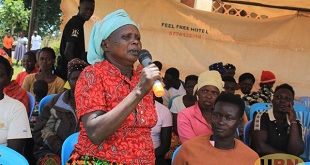
Kampala, Uganda | THE INDEPENDENT | Sports federations under their newly formed Union of Uganda Sports Federations and Associations- UUSFA have complained about the unfair distribution of funds among sports federations in the country. The issue came up during a meeting between the Speaker of Parliament Rebecca Kadaga and the leadership of Uganda Sports Federations and Associations on Monday.
According to UUSFA, the country lacks a sports funding policy which leaves many sports federations in the dilemma of facilitating their activities while others are fully funded. “Sports in Uganda is so underdeveloped and this is because of the absence of a sports funding policy. It is very unfortunate that Ugandan sports funds are spent without the necessary enabling law/policy which would have guided us all on how and where to spend our sports funds allocated by parliament,” read a statement presented by Robert Jaggwe, the UUSFA secretary-general.
Adding that, “Whereas there are totally no funds even as little as Shillings 100 million for each federation to support their yearly calendars and budgets over 12 months for sports development inside Uganda, one team can be given over Shillings 300 million or even a billion Shillings to go and spend outside Uganda in less than 14 days. He also noted that government has prioritized a few disciplines like football, basketball, athletics, netball, boxing, rugby, University sports and Paralympic sports.
According to Jaggwe, the remaining federations only get funds after intense unprofessional lobbying. The government allocated Shillings 16.4 billion to the sports sector in the 2020/2021 financial year. However, over Shillings 10 billion was ring-fenced for the Federation of Uganda Football Associations- FUFA. This leaves a balance of Shillings 6.4 billion for the remaining federation to share.
UUSFA has also asked for a repeal of the National Council of Sports Act of 1964, which according to them is totally outdated and cannot address the modern sporting environment and needs of the 21st century. The union argues that there are many things that potential investors could do to help Ugandan sports even without government funding but they are limited because of the obsolete law.
Section 5 of the Act limits the funding of the council to the government without clearly spelling out how other sponsors can come in. In the same meeting, the Union called for the increase in sports funding from Shillings 16.4 billion to Shillings 200 billion to make sports admirable. In her response, Kadaga said that she has an idea about what has been happening in the sports sector and acknowledged the policy gap that needs to be addressed.
She also said the government had earlier on hinted on the need to repeal the NCS 1964 Act, saying she will address the parliament on the issue.
Jaggwe said they are pleased that the speaker has welcomed their proposals and promised to further their agenda.
*****
URN
 The Independent Uganda: You get the Truth we Pay the Price
The Independent Uganda: You get the Truth we Pay the Price



